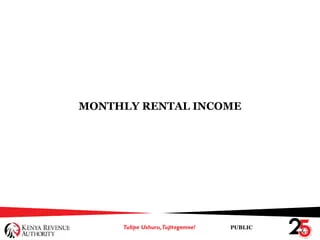Rent, in the context of property, refers to payments received from granting the right to another person for the use or occupation of immovable property. In Kenya, a specific taxation framework known as Monthly Rental Income (MRI) has been established to streamline the taxation process for residential rental income.
This article provides a comprehensive overview of MRI, its eligibility criteria, tax rates, exemptions, registration process, filing procedure, and payment guidelines.
Monthly Rental Income (MRI) Overview
Monthly Rental Income, also known as Residential Rental Income Tax, was introduced through the Finance Act 2015 and became effective on January 1, 2016. This tax regime applies to resident individuals or companies earning rental income from residential properties within Kenya. The Finance Act 2020 further refined the application, making MRI applicable to individuals earning rental income ranging from Kshs. 280,000 to Kshs. 15 million during any year of income, starting from January 1, 2021.
Tax Rate and Exemptions
As of January 1, 2024, the MRI tax rate is 7.5% on the gross rent received, and it is considered a final tax. No deductions for expenses, losses, or capital are allowed. Exemptions from MRI include rental income from commercial properties, non-resident landlords, and landlords earning over Kshs. 15 million per year.
Appointment of Rental Income Tax Agents
The Finance Act 2023 introduced a provision for the appointment of rental income tax agents effective July 1, 2023.
These agents are responsible for collecting and remitting rental income tax to the Commissioner. The tax rate for agents is 7.5%, effective January 1, 2024.
MRI Return Filing and Payment
MRI returns are submitted online via the iTax platform, and the due date for filing is within five working days after the deduction is made. Late filing incurs penalties of Kshs. 2,000 or 5% of the tax due (whichever is higher) for individuals and Kshs. 20,000 or 5% of the tax due (whichever is higher) for corporations. Late payment attracts a 5% penalty, and late payment interest is charged at 1% per month or part thereof.
Property Registration for MRI
Property owners need to register their properties for MRI through the iTax platform. The registration process involves providing details of the property, PIN of tenants, estimated monthly rental income, and choosing from options such as new property registration, updating property details, or deregistering a property.
Filing MRI Returns
Filing MRI returns involves selecting the appropriate option (original or amended return) and providing details of the monthly rental income. The system automatically calculates the tax due and considers any rental withholding certificates and applicable credits.
Payment of MRI
After filing the MRI return, a payment slip is generated on iTax, and payment can be made through various channels, including mobile payments and banks.
Example Calculation:
- Property A – 5 units * Kshs. 20,000 * 12 months = Kshs. 1,200,000
- Property B – 10 units * Kshs. 15,000 * 12 months = Kshs. 1,800,000
- Total Rent Income = Kshs. 3,000,000
- Allowable Expenses (e.g., Land Rent, Insurance, Agent’s Fees, Repairs, Loan Interest, Electricity) = Kshs. 365,000
- Net Taxable Rent Income = Kshs. 2,635,000
Conclusion
Understanding the intricacies of Monthly Rental Income (MRI) is crucial for property owners and landlords in Kenya. Compliance with MRI regulations ensures a smooth and transparent taxation process, contributing to the development of public services and infrastructure in the country.
Property owners are encouraged to stay informed about updates in taxation laws to fulfill their obligations accurately and efficiently.




